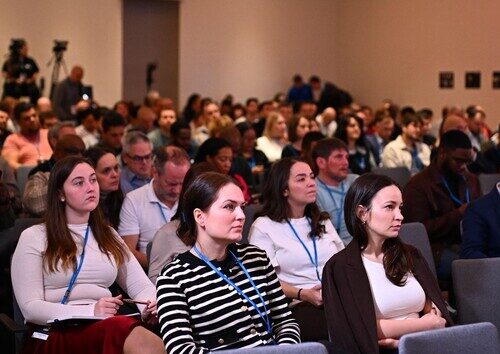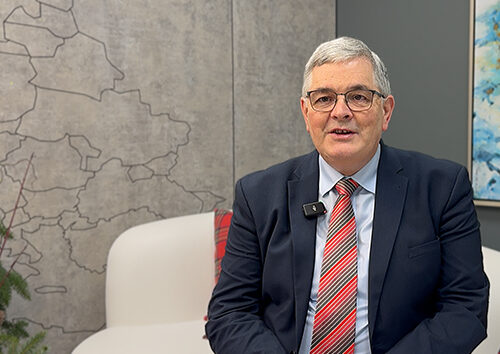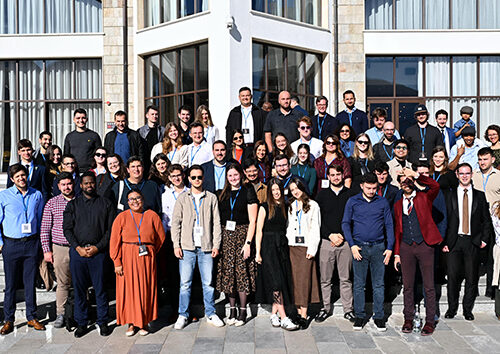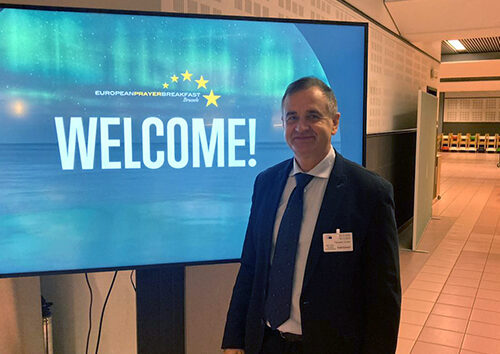16 November | Pravets, Bulgaria [David Neal]
From 12–15 November 2025, communication, media, IT, publishing, and other Adventist professionals from across Europe gathered in Pravets, Bulgaria, for the Global Adventist Internet Network (GAiN) conference, hosted under the theme “Let There Be Light.” Behind this theme lies a shared value that unites the Trans-European Division (TED), the Inter-European Division (EUD), and Hope Media Europe (HME): What must we do together to reach Europe with Jesus’ love?
“This is much more than a technical conference,” note lead organisers Vanesa Pizzuto (TED), Paulo Macedo (EUD), and Klaus Poppa (HME), “because this question drives our collaboration, our creativity, and our commitment to telling stories that illuminate Christ’s compassion across a diverse continent.”
But what does this look like in practice? In his lecture The Together Way, Norel Iacob explained that true collaboration means sharing inspiration, exchanging content, co-producing projects, creating joint series, and using common platforms. Referencing Philippians 2:14, he reminded listeners that this is a Christ-centred value: “Let each of you look not only to his own interests, but also to the interests of others.”
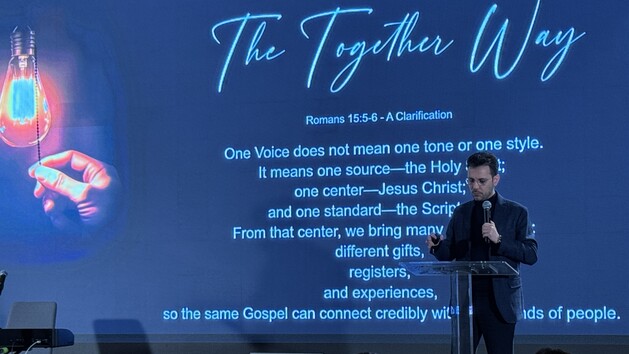
Alongside the workshops and networking, the keynote presentations stood out, offering the insights and shared vision that shaped the event.
Prayer and the Spirit Are Non-Negotiable
Opening the conference, Brad Kemp (South Pacific Division Communication and Media director) drew on a lifetime of ministry leadership to share lessons from his presentation “The Essence of Things.” He emphasised that effective ministry starts with gathering the right team, setting a clear direction, and fostering a shared commitment to the Kingdom vision. Kemp urged leaders to embrace collaboration over silos, think boldly, and communicate purpose with clarity. Referencing Acts 4 and 2 Corinthians 5, he underscored that prayer, openness to the Holy Spirit, and seeking God’s guidance are essential, non-negotiable foundations for every media initiative.
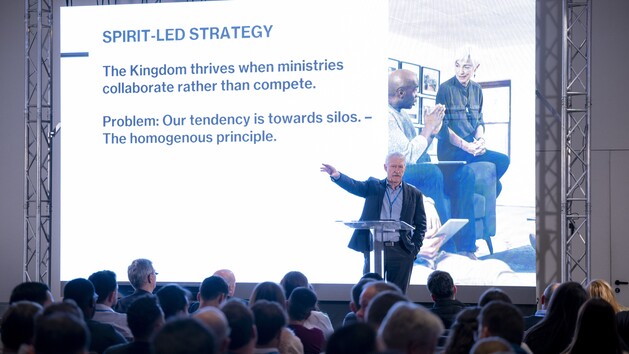
Mission and Spiritual Growth
Klaus Poppa, president of Hope Media Europe, shared in the opening service that GAiN Europe exists “not merely for professional excellence, but for mission and personal spiritual growth.” Poppa continued, “It is a space where culturally and personally diverse communicators find Spirit-given unity and shared purpose—learning to bear one another’s burdens, as Galatians 6:2 urges—and in doing so, fulfils the law of Christ.”
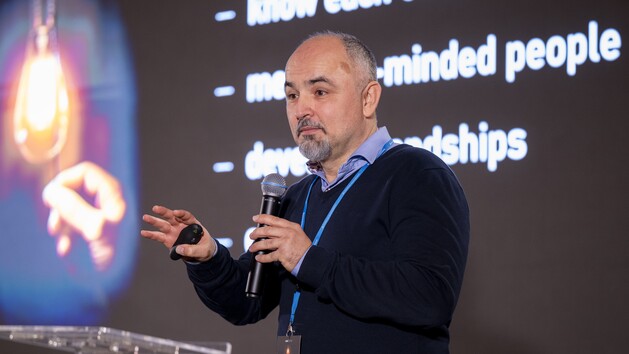
“The personal life of the communicator is as important as the message being shared,” said Ramón Canals, Ministerial Secretary of the General Conference. As a leader, Canals described his mission as one of encouraging, energising, empowering, and equipping others for the sake of the mission. He reminded communicators that real effectiveness flows from a shared spirit of unity and humility — the very attitude Paul prayed for: “May the God who gives endurance and encouragement give you the same attitude of mind toward each other that Christ Jesus had, so that with one mind and one voice you may glorify the God and Father of our Lord Jesus Christ.” (Romans 15:5-6).
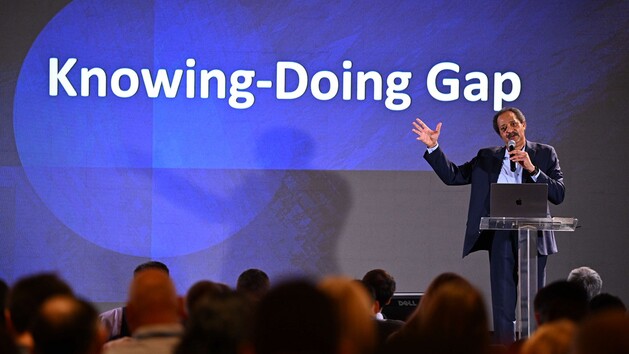
Light for a Polarising World
The subtext of this year’s ‘Let There Be Light’ theme addressed the growing polarisation in today’s public discourse — an issue Adventist communicators continue to wrestle with, as keynote speakers repeatedly highlighted throughout the event.
During Thursday morning’s devotional, Vanesa Pizzuto focused on Jesus and the Samaritan woman, noting, “The kind of communication we need in this polarised world will start by building trust and connection, highlighting first what we have in common — and with it, the need to be seen for who we really are, without shame.”
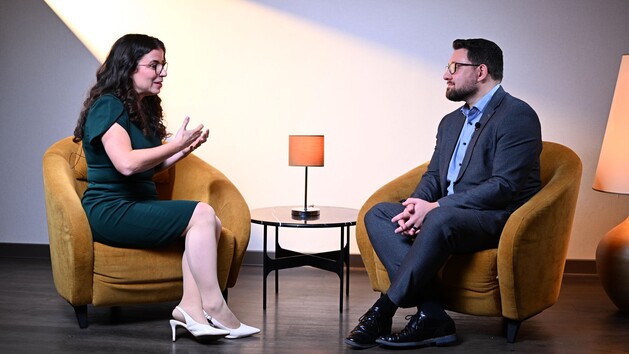
In his Friday evening devotional, Pastor Ian Sweeney opened with Jesus’ own declaration in John 8:12: “I am the light of the world. Whoever follows me will have the light of life and will never walk in darkness.” From this, he warned that today’s ministries can too easily mirror the Pharisees—shining a spotlight on darkness rather than walking in Christ’s light. Pointing to online platforms that thrive on exposing sin, he cautioned that such “success” can still be darkness-centred, challenging listeners to ask whether their ministry is shaped by darkness or by the Light Himself.
Continuing the theme of his Sabbath sermon, Sweeney’s reflections delved into John 8:1-11, noting that we often see only a person’s history, as starlight reveals only the past. Jesus, however, looked beyond a woman’s failures to her future, speaking words that moved “faster than light”: “I do not condemn you… go and sin no more.” This transforming grace, he noted, was evident not only in her life but also in the rapid change seen in Zacchaeus and others who met the Light of the World.
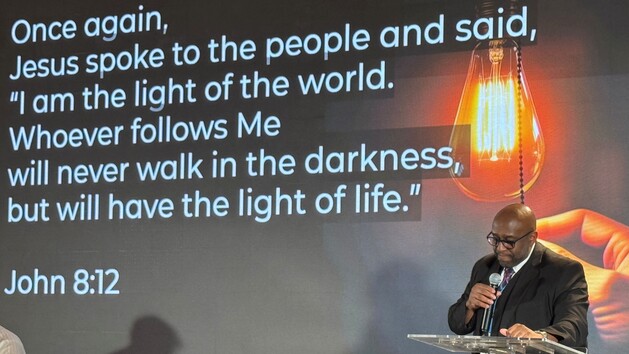
When Presence Becomes Light
Paulo Macedo reflected on Jesus’ experience at the Feast of Dedication in John 10:22-24, noting that Jesus was there not only because it was a significant part of His Jewish tradition, but because His presence fulfilled the festival’s deepest meaning. As Macedo put it, Jesus stood among the people as the true Light who restores God’s people—yet many still struggled to recognise Him.
From this, Macedo drew a lesson for communicators about the power of presence. We work among people who carry their own customs, traditions, and expectations, and we often wrestle with whether we should step into certain spaces. But, he suggested, the real question isn’t whether to be present, but why and for what purpose. If we were communication leaders in Jesus’ time, would we have advised Him to attend that festival? Yet He chose to be there—celebrating with people and using that very moment to invite them to a higher understanding.
People were celebrating the lights while standing in the presence of the Light of the World. Macedo’s challenge was clear: should we not also find the courage to be present in places we might instinctively avoid for safety or comfort, trusting that God can use those moments for deeper connection and meaning?
Faith in the Marketplace

In a discussion hosted by Vanesa Pizzuto—and featuring Paulin Giurgi (Hope Media Europe), Paulo Macedo, Kimberly Luste Maran (North American Division Communication & Media director), and Ian Sweeney—the conversation forcussed on the pressing question for today’s communicators: in an age of polarised communication, how can we speak in ways that share our faith constructively and meaningfully?
Paulin Giurgi reflected on the importance of context, particularly in a society increasingly marked by polarisation and secularism. He emphasised that communicators must not lose touch with the transcendence of God, as there are still many who carry within them a God-shaped hole. Giurgi also highlighted the necessity of interpreting the prophetic messages of Revelation through a Christ-centred lens, noting that when Christ remains at the heart of the message, it becomes far more compelling and engaging.
Kimberly Luste Maran stressed the need to present Jesus—and the hope found in the Adventist message—in ways that are both attractive and compelling. Acknowledging that Adventist beliefs may not always align with popular cultural narratives, she pointed out that in a society quick to “cancel,” believers should be prepared for resistance, even asking, “Was Jesus ever cancelled?” For her, effective communication must balance truthfulness with love, ensuring both accuracy and compassion are present in every message shared.
Drawing from the framework provided by the United Nations, Paulo Macedo pointed out the distinctions made between key freedoms: the freedom of speech, freedom of thought, and freedom of religion. He noted that the same document outlines six specific criteria for identifying hate speech, making clear that while open discussion and critique of ideas is permissible, any speech inciting harm or attacking individuals or groups crosses an ethical and legal boundary. This, he suggested, serves as a valuable guide for faith-based communication in sensitive or hostile environments.
Ian Sweeney offered a concise yet powerful perspective: communication in today’s climate should be marked by friendship, not aggression. He urged communicators to recognise the cultural moment and to shape their messaging with grace and appeal, ensuring it remains winsome and relevant to the audience they seek to reach.
During the discussion, a question from the audience addressed the challenge of navigating polarised congregations. In response, the panel advised communicators to proceed with caution, always remembering that they represent more than personal opinion—they speak on behalf of the Church. As institutional voices, communication leaders and pastors are called to reflect the character and values of Christ above all else. The panel underscored that partisanship has no place in church leadership; rather, those in such roles must strive to be unifying figures, upholding a message of grace, truth, and integrity that transcends political or ideological divides.
The conversation ended with 2 Tim 1:7, “For the Spirit God gave us does not make us timid, but gives us power, love and self-discipline.”
When All is Said and Done
The Pravets Lake setting in Bulgaria is, for most participants, nothing short of spectacular. Yet “there is something special about GAiN Europe,” remarked a returning General Conference leader who has attended each of the past three gatherings. “It is well organised, great for real networking, and the programme offers space to breathe, walk, and enjoy the tranquillity of the lake.” This blend of setting, structure, fellowship, and rhythm once again proved ‘just right’—inspiring participants to Rise, Shine, and Tell the Story within their own spheres of influence.
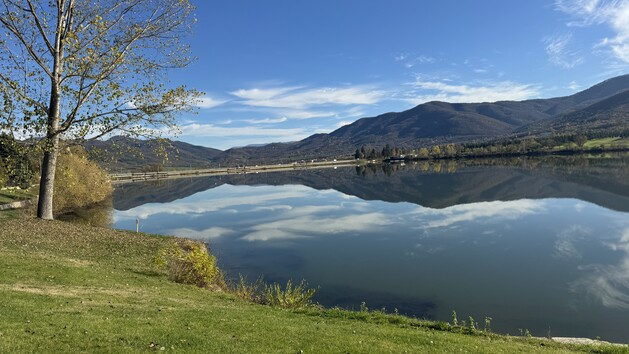
[Featured Image: Nikolay Stoykov / Adventist Media Exchange (CC BY 4.0)]
[Photos: Nikolay Stoykov / Adventist Media Exchange (CC BY 4.0) and David Neil]
